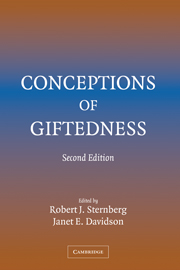Book contents
- Frontmatter
- Contents
- Preface
- List of Contributors
- 1 Gifted Education Without Gifted Children: The Case for No Conception of Giftedness
- 2 Youths Who Reason Exceptionally Well Mathematically and/or Verbally: Using the MVT:D4 Model to Develop Their Talents
- 3 A Child-Responsive Model of Giftedness
- 4 School-Based Conception of Giftedness
- 5 Giftedness, Talent, Expertise, and Creative Achievement
- 6 Permission to Be Gifted: How Conceptions of Giftedness Can Change Lives
- 7 From Gifts to Talents: The DMGT as a Developmental Model
- 8 Nurturing Talent in Gifted Students of Color
- 9 The Munich Model of Giftedness Designed to Identify and Promote Gifted Students
- 10 Systemic Approaches to Giftedness: Contributions of Russian Psychology
- 11 Giftedness and Gifted Education
- 12 The Importance of Contexts in Theories of Giftedness: Learning to Embrace the Messy Joys of Subjectivity
- 13 Feminist Perspectives on Talent Development: A Research-Based Conception of Giftedness in Women
- 14 The Three-Ring Conception of Giftedness: A Developmental Model for Promoting Creative Productivity
- 15 In Defense of a Psychometric Approach to the Definition of Academic Giftedness: A Conservative View from a Die-Hard Liberal
- 16 Creative Giftedness
- 17 Genetics of Giftedness: The Implications of an Emergenic–Epigenetic Model
- 18 The WICS Model of Giftedness
- 19 Beyond Expertise: Conceptions of Giftedness as Great Performance
- 20 Domain-Specific Giftedness: Applications in School and Life
- 21 Extreme Giftedness
- 22 Making Giftedness Productive
- 23 The Actiotope Model of Giftedness
- 24 The Scientific Study of Giftedness
- Author Index
- Subject Index
24 - The Scientific Study of Giftedness
- Frontmatter
- Contents
- Preface
- List of Contributors
- 1 Gifted Education Without Gifted Children: The Case for No Conception of Giftedness
- 2 Youths Who Reason Exceptionally Well Mathematically and/or Verbally: Using the MVT:D4 Model to Develop Their Talents
- 3 A Child-Responsive Model of Giftedness
- 4 School-Based Conception of Giftedness
- 5 Giftedness, Talent, Expertise, and Creative Achievement
- 6 Permission to Be Gifted: How Conceptions of Giftedness Can Change Lives
- 7 From Gifts to Talents: The DMGT as a Developmental Model
- 8 Nurturing Talent in Gifted Students of Color
- 9 The Munich Model of Giftedness Designed to Identify and Promote Gifted Students
- 10 Systemic Approaches to Giftedness: Contributions of Russian Psychology
- 11 Giftedness and Gifted Education
- 12 The Importance of Contexts in Theories of Giftedness: Learning to Embrace the Messy Joys of Subjectivity
- 13 Feminist Perspectives on Talent Development: A Research-Based Conception of Giftedness in Women
- 14 The Three-Ring Conception of Giftedness: A Developmental Model for Promoting Creative Productivity
- 15 In Defense of a Psychometric Approach to the Definition of Academic Giftedness: A Conservative View from a Die-Hard Liberal
- 16 Creative Giftedness
- 17 Genetics of Giftedness: The Implications of an Emergenic–Epigenetic Model
- 18 The WICS Model of Giftedness
- 19 Beyond Expertise: Conceptions of Giftedness as Great Performance
- 20 Domain-Specific Giftedness: Applications in School and Life
- 21 Extreme Giftedness
- 22 Making Giftedness Productive
- 23 The Actiotope Model of Giftedness
- 24 The Scientific Study of Giftedness
- Author Index
- Subject Index
Summary
As you look at the crisp night sky, you see that one star stands out – brighter than all others. Perhaps, so it is with giftedness: As you look into a classroom, you see that one student stands out – brighter than all others. Although astrophysicists can explain the nature of an extraordinary star, psychologists continue to struggle with how to conceptualize giftedness. Conceptions of Giftedness provides an up-to-date and diverse collection of ideas about what giftedness is and how gifted students should be educated.
There are many ways to conceptualize giftedness, ranging from practical conceptualizations based on years of experience in working with gifted students to political conceptualizations based on moral principles. However, the distinguishing feature of the scientific study of giftedness is that theories are tested against evidence that has been collected using sound methodologies. The theme of this chapter is that there is value in the scientific study of giftedness, that is, in using an evidence-based approach to assessing the usefulness of various theories of giftedness and in assessing the effects of various academic programs for gifted students.
FIVE QUESTIONS ABOUT GIFTEDNESS
In the book's introduction, the editors – Robert J. Sternberg and Janet E. Davidson–begin by listing five questions about giftedness that each author was asked to answer. I attempt to answer the five questions – which are listed in Table 24.1 – based on work presented in these chapters. Then, I briefly offer my opinion concerning future directions for the field.
- Type
- Chapter
- Information
- Conceptions of Giftedness , pp. 437 - 448Publisher: Cambridge University PressPrint publication year: 2005
- 29
- Cited by

